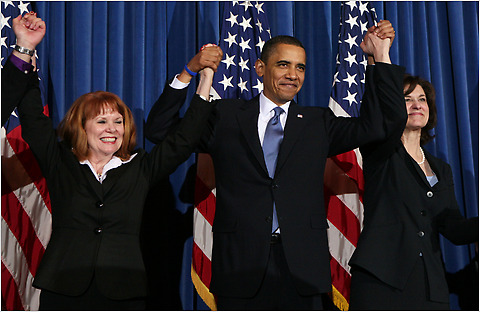
OBAMA HAS SIGNED THE BILL. NOW WHAT?
DAVID M. HERSZENHORN
Even some popular changes that Democrats are promoting as “immediate benefits,” like allowing adult dependent children to remain on their parents’ insurance policies, do not actually take effect for six months.
 Stephen Crowley/The New York Times President Obama with Connie Anderson, left, and Victoria Kennedy.
Stephen Crowley/The New York Times President Obama with Connie Anderson, left, and Victoria Kennedy.But when President Obama signed the Senate bill into law at the White House on Tuesday morning, some provisions took effect immediately.
For example, states will be required to maintain their existing Medicaid and children’s health insurance coverage based on policies currently in effect. While states can expand their programs, they are not allowed to cut back on eligibility and are not allowed to put in place any paperwork requirements that would make it harder for people to sign up for coverage, according to Jocelyn A. Guyer, co-executive director of the Center for Children and Families at Georgetown University.
The provision could prove crucial given that states are facing big budget shortfalls because of the recession. Arizona, for instance, dropped its children’s health insurance program last week in a budget bill signed by Gov. Jan Brewer, a Republican, a move that will leave 47,000 low-income children uninsured.
States had already been banned from tightening Medicaid eligibility through the end of the year as a condition of new federal aid provided in last year’s economic stimulus program. But as a result of the signing of the Senate health care bill today, states will have to maintain their Medicaid and children’s health insurance rules until new state-based insurance exchanges are up and running in 2014.
Given that the Senate bill is more than 2,400 pages long, it is not easy to pinpoint the effective date for every provision. But there are other provisions that seem to go into effect immediately, or at least as quickly as officials can implement.
For instance, “freestanding birth centers” are now eligible for Medicaid payments.
Another provision that appears to take effect right away is an expansion of Medicare to cover certain victims of “environmental health hazards,” which was aimed specifically at the town of Libby, Mont.
As Robert Pear reported in the Times in December, the beneficiaries are people who were exposed to asbestos from a vermiculite mine. The provision was inserted by Senator Max Baucus, Democrat of Montana and a lead author of the Senate health care measure.
Another provision that takes effect immediately is a requirement that the secretary of health and human services establish criteria “for determining whether health insurance issuers and employment-based health plans have discouraged an individual from remaining enrolled in prior coverage based on that individual’s health status.”
Other provisions will kick in shortly. For example, a provision on “transparency in government” requires the secretary of health and human services to post on the Internet within 30 days “a list of the authorities provided to the secretary under this act.”
Another provision requires that within 60 days the secretary “develop a standardized format to be used for the presentation of information relating to coverage” — so that consumers have a more understandable way of comparing health benefits — like medical, surgical, hospital and prescription drug coverage — offered by private insurers.
prescriptions.blogs.nytimes.com/2010/03/23/with-obama-signing-the-bill-what-happens-now/
March 23, 2010
